
Chlorine is often seen as a necessary evil in the world of pool maintenance. It is a potentially dangerous chemical, it has to be handled carefully, it can sting the eyes, and it smells bad. However, for decades, chlorine has been used to keep pools from becoming dangerous breeding grounds for bacteria, algae, and viruses. Without a sanitizing agent, the backyard pool will quickly become a cesspool of cloudy, disgusting water that can make swimmers extremely ill.
However, there is an alternative to using harsh chlorine in your swimming pool. Many pool owners are opting to install saltwater pools in their back yards, avoiding the use of stinky, dangerous chlorine. If you have been hearing the rave reviews of saltwater pool owners, here are a few of the benefits of saltwater pools.
Maintenance
Saltwater pool maintenance is often much simpler than that of a chlorine pool. The interesting thing about a saltwater pool is that it is not completely chlorine-free. These pool systems actually generate their own chlorine using the salt through a process called electrolysis. The electrolysis uses salt to continually generate hypochlorous acid which disinfects the pool. These pool systems are continually maintaining low chlorine levels to keep the pool clean, but there is no harsh chemical smell and no stinging of the eyes and skin.
While a saltwater pool requires less maintenance than a chlorine system, the pool owner does have to do a little maintenance. Typically, though, saltwater systems require less maintenance than chlorine systems. Once a week, the water should be tested for free chlorine and adjusted with the output control of the electrolysis unit. Also, the pH should be tested and tweaked as needed by the addition of soda ash or sodium bicarbonate. Monthly, the water’s calcium, alkalinity, stabilizer, and salt levels should be tested, with adjustments made as directed by the owner’s manual. Once every three months, pool owners should open up the electrolysis unit and inspect it for mineral deposits or debris. Of course, the skimmer, pump, and filter should be maintained as with any pool system.
Much More Gentle
The water in saltwater pools just feels different. If you have ever bathed in water that is softened, you know that the water feels silky smooth and gentle to the skin. Harsh, chlorinated water does not feel that way. Saltwater pools feel like rainwater on your skin. Also, saltwater pools do not leave chlorine residue on your skin, hair, or bathing suit. You will not have to worry that your little tow-headed nephew will end up with green hair from overexposure to chlorine. Additionally, your bathing suit won’t need to be replaced as often due to chlorine damaging the fabric. Your eyes will not sting and those with asthma or allergies will not react to the harsh chlorine in the air and water around your pool.
Saltwater is a Safer System
Have you ever read all of the warnings printed on the typical container of pool chlorine or a bottle of bleach?
“May cause burns.”
“Avoid skin and eye contact.”
“Can cause shortness of breath and nausea.”
If you have small children or pets, it can be a little scary to have those kinds of chemicals sitting around in the garage or basement. A saltwater system does not require you to store or use such dangerous chemicals in your home and yard.
The Natural Choice
Nowadays, many families are going out of their way to avoid exposure to dangerous chemicals. They use vinegar and baking soda to clean their homes, and they buy organic produce and food products. It seems a little odd for these families to pour chlorine into a swimming pool to keep it clean. These families may be drawn to saltwater systems to avoid using such a dangerous chemical in the pool.
If you live in the Chicago area and are interested in discussing the installation of a saltwater pool or if you have questions about converting an existing pool to a saltwater system, contact Sunset Pool and Spas today!